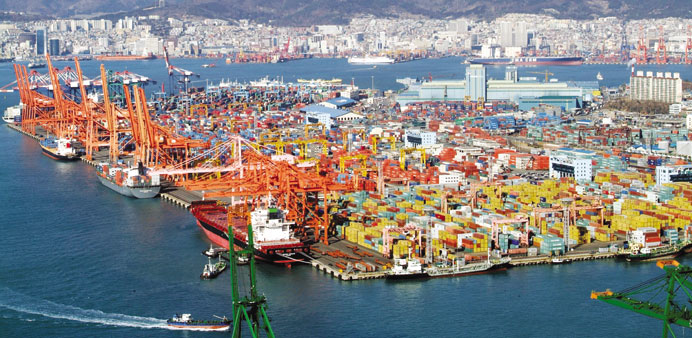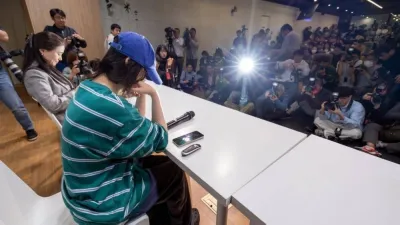A view of the Busan Port in South Korea. Exports fell 8.3% in September from a year earlier, less than a median 10% drop forecast in a Reuters survey and improving from a revised 14.9% decline in August, South Korea’s trade ministry data showed yesterday.
Reuters/Seoul
South Korean exports in September fell for a ninth consecutive month on-year but were offset by signs of a pick-up in domestic demand, undermining the case for an additional interest rate cut soon.
Exports fell 8.3% in September from a year earlier, less than a median 10% drop forecast in a Reuters survey and improving from a revised 14.9% decline in August, trade ministry data showed yesterday.
“Domestic demand appears to be sustaining its recovery and the recovering real-estate market also supports a further pick-up in domestic demand down the road,” said Moon Hong-cheol, a fixed-income analyst at Dongbu Securities. “Exports are not a direct factor for central bank policy consideration and therefore I think the case for an interest rate cut has diminished.”
The finance ministry expressed confidence yesterday the recovery in domestic demand would accelerate, helped by a government-initiated discount sales campaign, dubbed the South Korean version of the US’s post-Thanksgiving Black Friday shopping spree.
Yesterday marked the first day of the two-week sale campaign, under which the finance ministry said earlier around 26,000 stores across the country including big department and discount stores have pledged to offer discounts of up to 70%. Separate data from the statistics agency showed earlier in the day that industrial output in August grew by a seasonally adjusted 0.4% from July, better than a median 1.1% fall tipped in the Reuters survey. The won and share prices rose while the main bond futures contract fell as the August output and September exports figures eased concerns over Asia’s fourth-largest economy, limiting the prospects of an interest rate cut.
Data from Statistics Korea also showed the retail sales index rose by a seasonally adjusted 1.9% in August from July on top of a revised 2% gain in July, extending its recovery from weakness in much of the first half of the year. The Bank of Korea cut its policy interest rate by a total of 1 percentage point to record-low 1.50% in four steps between August last year and June this year to spur consumer spending at a time of depressed export demand.
This and the government’s stimulus measures did help spark a pick-up in the local property market, with a key private-sector indicator showing early yesterday that house prices rose for a 25th consecutive month in September on-month. The Bank of Korea is due to release its revised economic growth forecasts for this and next year on October 15.



